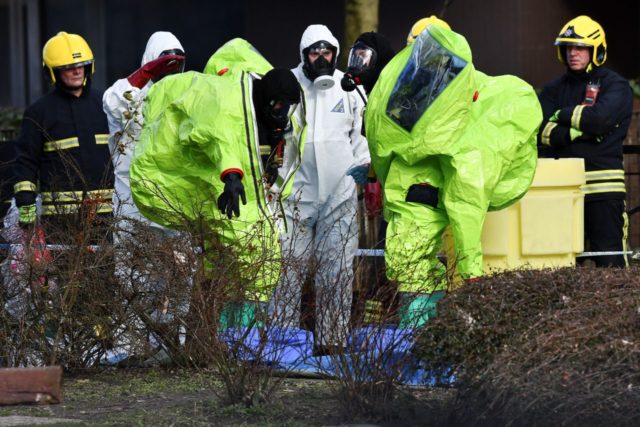A spokesman for Russian President Vladimir Putin on Thursday denounced a new round of U.S. sanctions as “categorically unacceptable” and “illegal,” while the Russian Foreign Ministry promised retaliatory sanctions are in the planning stages.
“Once again we totally reject any allegations of possible Russian government involvement over what happened in Salisbury. Russia did not have and does not have anything to do with the use of chemical weapons,” Putin spokesman Dmitry Peskov said in a conference call with reporters on Thursday.
Peskov was referring to the nerve-agent attack on former spy Sergei Skripal and his daughter Yulia in March. The U.S. State Department on Wednesday invoked the Chemical and Biological Weapons Control and Warfare Elimination Act of 1991 to impose new sanctions against the government of the Russian Federation for using the banned Novichok chemical weapon against the Skripals.
Peskov said the sanctions were contrary to the “constructive atmosphere” established during U.S. President Donald Trump’s July summit with Putin in Helsinki.
“This relationship is not only in the interests of our peoples but also for strategic stability and security in the world,” he said.
“Putin has said more than once and he has demonstrated a constructive approach and his readiness to find a way out of difficult situations and discuss difficult questions. No one should doubt that Putin will not keep to this approach. We are sorry that often we are not met with cooperation on this account,” Peskov added.
State Department officials said there would be “carve-outs” in the sanctions for “the provision of foreign assistance to Russia and to the Russian people,” as well as for joint spaceflight activities and commercial aviation. Other exemptions could be granted on a case-by-case basis.
With those possible exemptions in mind, the State Department estimated the value of the new sanctions could “reach potentially hundreds of millions of dollars.”
The officials said another round of sanctions could be forthcoming unless Russia meets “certain criteria,” which include halting the use of all chemical and biological weapons and permitting on-site inspections of its facilities by international observers.
Russian Foreign Ministry spokeswoman Maria Zakharaova denied Russian involvement in the Skripal poisoning on Thursday and said Moscow is working on unspecified “retaliatory measures” against the United States.
Zakharova described the new sanctions as an “unfriendly act” and accused the U.S. of trying to “demonize” Russia.
Konstantin Koschev, chairman of foreign affairs in the upper house of the Russian parliament, fumed that the U.S. is acting like a “police state” by “threatening and torturing a suspect to get evidence.” He said the new sanctions amount to “inflicting a punishment in the absence of a crime, in the tradition of lynch law.”
“The theater of the absurd continues,” said Dmitry Polyanskiy, Russia’s first deputy representative to the United Nations. “No proofs, no clues, no logic, no presumption of innocence, just highly-likelies. Only one rule: blame everything on Russia, no matter how absurd and fake it is.”
“Let us welcome the United Sanctions of America!” Polyanskiy added sarcastically.
The new sanctions will not fully take effect until later in August, but already the Russian ruble tumbled to two-year lows and nervous investors began selling off Russian assets. Analysts described the Russian market as stunned by the weight of the new sanctions.
The government of the United Kingdom, where the Skripal poisoning occurred, applauded the Trump administration for imposing more sanctions on Russia.
“The UK welcomes this further action by our U.S. allies. The strong international response to the use of a chemical weapon on the streets of Salisbury sends an unequivocal message to Russia that its provocative, reckless behavior will not go unchallenged,” a spokesperson for the British Foreign Office said on Wednesday.

COMMENTS
Please let us know if you're having issues with commenting.